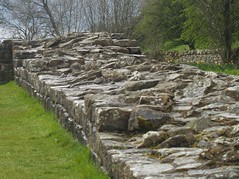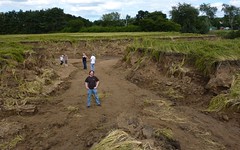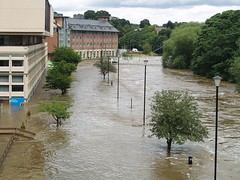My colleague, Jenny just alerted me to this new example of plagiarism hitting the news – it’s always useful to have real examples to demonstrate to students what might happen!

Hadrian’s Villa, near Rome, July 2009

My colleague, Jenny just alerted me to this new example of plagiarism hitting the news – it’s always useful to have real examples to demonstrate to students what might happen!

Hadrian’s Villa, near Rome, July 2009
Over the last week, I have been running some workshops as part of our Postgraduate Researcher Development Programme. This particular workshop challenges PGs to start thinking of themselves as both producers and consumers of information and what it really means to be an information literate researcher. Interestingly, when they self assess their own IL level, very few give themselves top marks, so that gives us a starting point for discussion. We talk about way to get started with writing, thinking about writing book reviews or opinion pieces maybe and they think about their IPR rights, retaining their copyright, their views on Open Access publication and their responsibilities to their peers to cite correctly.

The Library in Hadrian’s Villa near Rome, July 2009
I still haven’t got into twittering about myself, but we have started to tweet in the Library. We’re tweeting separately about Science/ Engineering topics and Arts topics. I’m finding that it’s good fun to do, very quick and easy and a great way to communicate ephemeral pieces of information. At the moment we don’t have a mechanism in place to judge how effective it is – I’d be interested to know from others who are twittering about their library how they measure this. We can’t just count “followers” as you can still read the tweets and even set up an RSS feed from them, without being a follower.

A hot day in Florence, Aug 2009
Thanks to Jackie for alerting me to Educause’s report on Students and IT There’s a table (Table 4-5) in the report that depicts students’ perceptions of their information literacy skills – interesting!

Drinking fountain, Siena, Italy, July 2009
I went to a very interesting presentation at the Vitae conference on the Researcher Development Framework – badged as “a tool for planning, promoting and supporting the personal, preofessional and career development of researchers” I was pleased to hear that the framework goes beyond just describing competencies or skills and addresses knowledge, behaviours and personal qualities as well. This sits much better with my own understanding of information literacy as being about attitudes, habits and behaviours relating to information, rather than just skills in managing it and I could see how IL could sit comfortably within the new framework.
The proposed framework builds on the Joint Skills Statement, with a matrix of “domains” and “descriptors” based around 5 levels of development. From the small section I saw, there are definitely elements of IL already present. It will be released for consultation soon and I look forward to seeing the whole framework and hopefully contributing to it’s final form.

Hadrian’s Wall, Lanercost.
My attendance at the Vitae conference was sponsored by SCONUL and supported by RLUK and the RIN, so that Wendy White and I could give a presentation highlighting some of the issues in the RIN Mind the Skills Gap report. As usual I promised to put our slides onto my blog, so that anyone attending could download copies, so here they are:
Some of the feedback from our presentation was gathered on post-its, answering the question “tell us one thing which has occurred to you during this talk” (yes, I’m hooked on the one thing feedback idea!)and again, I promised delegates I’d include their comments on the blog, so here they are, in no particular order and in unedited form:
– need to review university training in respect of information literacy for wide researcher base, particularly research leaders
– information about information should be made available online so that all researchers can access the material – perhaps RCUK should fund such an exercise
– as a senior researcher/trainer/postgraduate developer how do I address my huge information skills gap in order to then more effectively encourage other researchers to fill their gaps!? It’s so important and a little overwhelming.
– incentives for improving data curation skills
– I think everyone today is in danger of information overload so in order to be an efficient researcher you really need to have the skills to recognise what is useful information and what is not
– impact, impact factor, new web based developments
– how can I promote my research publications to improve my H index?
– work with library staff to devise appropriate training for research staff
– how do we get buy in from these different stages of researchers? Is the message well received?
– choosing to plagiarise or not to plagiarise – links information skills and personal effectiveness (self confidence, finding your own voice etc)
– a lot of this conference seems to be about information literacy if we take this definition, why don’t I know more about it?
– the quote says it all [ quote was “The more you know, the more you realise that you don’t know, whereas if you don’t know you don’t know, you can be quite confident that you know”]
– need to think about the idea of attitudes and behaviours in relation to information, I haven’t thought of it as more than competencies before
On Tuesday I attended the Vitae Researcher Development Conference at the University of Warwick. It was attended by around 400 delegates, all people involved in supporting researchers, but only a handful of librarians were present. The conference was a great opportunity to hear about new developments in researcher support and you’ll find lots of information about it on their web pages.
I liked their use of Twitter in the opening plenary. Delegates sat around circular tables to listen to the speakers, each table equipped with a laptop, so we could twitter during the presentations and afterwards during our discussion. All the tweets were displayed on the large screens around the room and this gave very quick feedback on any common threads arising from the discussions. I wonder if we could use this technique within a teaching session with students?

Lea Gardens yet again
In talks I’ve given recently about Writing for Publication, I have mentioned all the good work Helen Fallon is doing in support of WfP, especially the workshops she runs for library staff. Helen has a blog “for library staff who wish to write for academic publication. It aims to facilate discussion about writing and publishing, particularly in librarianship and related areas. It should also provide a forum for posting messages such as calls for papers and conference presentations”
Pat and I have also been talking about having a CoW, a Community of Writers, and perhaps Helen’s blog is one way of facilitating this kind of community for library staff who are keen to start writing.

Durham Canyon July 2009
Our new NTF here at Newcastle, Colin Bryson, has written a very interesting SEDA paper on student engagement. I was particularly interested in the section on transition and engagement which makes the point that for students to be engaged by good T&L they need to have the self confidence and skills to engage. They recognise that libraries have role to play and describe a model of transition which is helpful in identifying the contribution of libraries and IL.

Floods in Durham 18th July 2009
see more photos of the floods here
I mentioned a few months ago that I had given a talk at LILAC with a colleague, Liz Stockdale and I put a link to a draft copy of our paper in our eprints repository. The paper was substantially revised after detailed advice from Susie Andretta and has now been published in the Journal of Information Literacy

Lea Gardens again